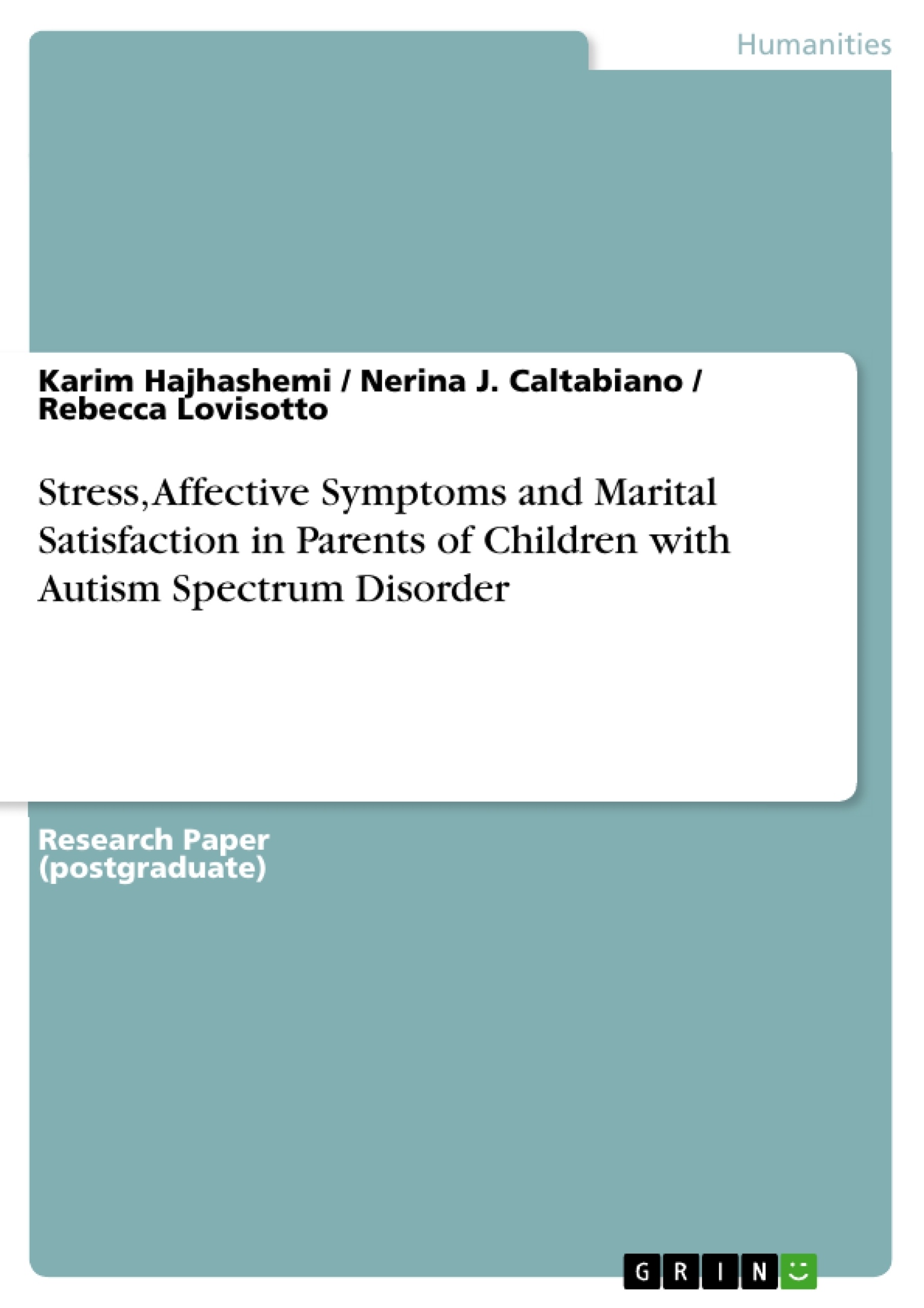Lovisotto, R., Caltabiano, N., & Hajhashemi, K. (2015). Parental stress, affective symptoms and marital satisfaction in parents of children with Autism Spectrum Disorder. International Journal of Humanities and Social Science, 5(10), 30-38.
Parents of children with Autism Spectrum Disorder (ASD), a life-long developmental disorder, responded to an online survey considering their stress experience, affective symptoms and marital satisfaction. As these parents sourced different programs for their children, type of program was used to assign parents to different groups in order to consider their stress, affective symptoms and marital satisfaction. The type of programs parents used included the Applied Behaviour Analysis (n=15); Early Intervention Centre (n=13) and no formal program (n=16). Parents of children with ASD in the ABA group reported significantly lower parental stress scores, lower affective symptoms scores and higher marital satisfaction scores compared to the other two groups. These results are suggestive of the beneficial effect that an ABA program can have on the family unit.
Inhaltsverzeichnis (Table of Contents)
- Introduction
- Method
- Participants
- Measures
- Procedure
- Results
Zielsetzung und Themenschwerpunkte (Objectives and Key Themes)
This study examines the relationship between intervention programs for children with Autism Spectrum Disorder (ASD) and the well-being of their parents. The main goal is to determine if there are significant differences in parental stress, affective symptoms, and marital satisfaction among parents whose children participate in Applied Behavior Analysis (ABA) programs, Early Intervention Centers (EIC), or no formal programs.
- Parental stress and well-being in families of children with ASD
- The impact of different intervention programs on parental stress, affective symptoms, and marital satisfaction
- The effectiveness of ABA programs compared to EICs and no formal programs
- The role of the Family Adjustment and Adaptation Response (FAAR) model in understanding parental stress
- The prevalence and significance of parental stress, affective symptoms, and marital dissatisfaction in families of children with ASD
Zusammenfassung der Kapitel (Chapter Summaries)
- Introduction: This chapter provides an overview of ASD, its prevalence, and its impact on families. It discusses the importance of early intervention and the effectiveness of ABA programs compared to other approaches. The chapter also reviews existing research on parental stress and well-being in families of children with ASD, highlighting the conflicting findings on the impact of intervention programs.
- Method: This chapter describes the methodology of the study, including the participant characteristics, the measures used to assess parental stress, depression, anxiety, marital satisfaction, and demographic information, and the procedures involved in collecting and analyzing the data. The chapter also includes details about the online survey used in the study and the data analysis techniques employed.
Schlüsselwörter (Keywords)
The study focuses on parental stress, parental depression, marital satisfaction, Autism Spectrum Disorder (ASD), Applied Behaviour Analysis (ABA), Early Intervention Centres (EIC), and the Family Adjustment and Adaptation Response (FAAR) model.
Frequently Asked Questions
What was the main goal of the Lovisotto et al. (2015) study?
The study examined how different intervention programs for children with Autism Spectrum Disorder (ASD) relate to parental stress, affective symptoms, and marital satisfaction.
Which three groups of parents were compared?
Parents were grouped based on the program their child used: Applied Behaviour Analysis (ABA), Early Intervention Centre (EIC), or no formal program.
What were the findings for the ABA group?
Parents in the ABA group reported significantly lower stress, fewer affective symptoms (like depression or anxiety), and higher marital satisfaction compared to the other groups.
What is the FAAR model mentioned in the study?
The Family Adjustment and Adaptation Response (FAAR) model is used to understand how families balance demands and resources to adapt to stressors like a child's disability.
Why is this research important for families of children with ASD?
It suggests that specific types of intervention programs, like ABA, may have beneficial spillover effects on the overall well-being and stability of the family unit.
- Arbeit zitieren
- Karim Hajhashemi (Autor:in), Nerina J. Caltabiano (Autor:in), Rebecca Lovisotto (Autor:in), 2015, Stress, Affective Symptoms and Marital Satisfaction in Parents of Children with Autism Spectrum Disorder, München, GRIN Verlag, https://www.grin.com/document/313796



